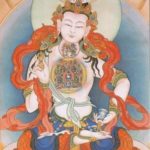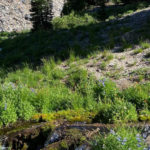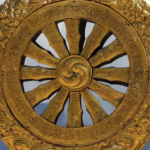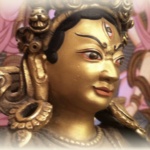Dear Friends,
One thing that unifies all of us is trauma, or as we put in Buddhism, the shared experience of human suffering. How we talk about this suffering changes what we assume about its causes and remedies.
When I think about it as anxiety, then a whole host of physiological and psychological issues comes to mind.
When I think about it as the felt experience of oppression, then ideas about social structures, conditioning and decolonization come to mind.
In Buddhism, this term ”suffering” encompasses this wide range of unnecessary suffering that we experience. Lately, however, I have been thinking of suffering in terms of trauma, the ultimate form of dukha as that invisible weight that shapes us, binds us and blinds us – but sometimes can be used as a stepping stone to practices of liberation.
This contemplation of trauma made me think of the Meditation Instructor Training in a new way this year. As we prepared this year’s course, on the forefront of my mind has been how crucial understanding of trauma adaptation is to the situation we are facing in our society. The anger, the denials, the glib admonishments towards positive thinking – social media is like a textbook display of trauma responses. And I have been seeing this in our responses not just to the pandemic and politics, but also in our responses to issues of racism and sexism. A large-scale awakening is taking place – but so is a showcase of maladaptive attempts to deal with suffering.
I am inspired and stretched by the challenge of training meditation instructors who will be prepared to step into this climate of turmoil. What does it mean to train teachers to be of service in such tumultuous times? I am driven by this question of how to prepare teachers to share Buddhist techniques for self-regulation, care for self, others and world – while there is so much rage, pain, denial, danger and depression.
Before, I framed it as a training that could provide the Buddhist philosophy of mind and body and Buddhist ethics to provide a more tradition-rooted approach to meditation teaching. I had already included a feminist agenda in there – driven by the question of how we can create responsible, ethical meditation instructors who will make Buddhism safe for vulnerable people.
Then the pandemic hit. And George Floyd. And the protests. And four million acres burned in California all around us. And the skies above grew thick with dark and toxic clouds of smoke.
Standing under the weight of all these circumstances, I let the scope of the Meditation Instructor Training expand to accommodate the great need to address acute suffering through contemplative practice. It is now a 150-hour training, spread over four months, a requirement which is on top of the three years of meditation practice prerequisite. The result is a training that goes in-depth into techniques and philosophy while it also reconsiders the Meditation teacher as someone who must be prepared to lead students into inner knowledge while they are weathering their toughest times.
It can be heavy and distressing to think of all these topics, whether you are joining the upcoming training or not. If so, we can take breaks, take our time and reach out to our networks of support.
It is also important to realize that all forms of oppression grow their power from our disconnection from our inner knowledge. Trauma rules our lives through our avoidance techniques (even though for the time being avoidance may be the best we can do). It is clear that the suffering of collective and institutionalized oppression gains power from that disconnection too. In Buddhism, we often repeat this core belief – that suffering comes from our disconnection from intrinsic wisdom. But the alternative to disconnection is to connect, and that is the complex, epic journey we embark on through practices of liberation. Somehow, step by step and painstakingly, sometimes crawling along and sometimes by leaps and bounds, it is possible to unravel the roots of suffering.
I have always loved that Dzogchen says that fundamentally, we are not just our suffering, there is also always something present in us which has remained wise and whole. As we listen to our body, cultivate a sense of wholehearted presence, act and speak with congruence with our highest values, when we listen and practice empathy – these are moments when we are living beyond the bounds of colonized, conditioned mindsets. This is how we break the chains. This is how we relieve suffering and live from a whole, good, loving place. In this sense, Buddhist practice gives me great hope that we can experience liberated moments and cultivate cultures of non-harming.
So it is coming to pass, that, in the middle of a global pandemic, while our forests have literally burned down around us, during this time of collective trauma and collective awakening, I will be training meditation teachers. I hope that this training will facilitate relief, empowerment and connection with inner knowledge.
I am pleased to be facilitating this training once again alongside my wonderful colleagues Aruna Rigdzin and Dr. Satya. This will be our fourth cycle of the online format. We begin on Saturday, October 31st. If you haven’t enrolled to join us yet, you can by Clicking Here: Meditation Instructor Training.
If you have already completed meditation teacher training, I encourage you to take the new modules on trauma-informed meditation teaching and mindfulness of power. You are welcome to join me:
November 14th – Trauma Informed Meditation Teaching
January 16th – Mindfulness of Power
For those of you who do not join us, you can still participate in our year-end meditation challenge. November 1st marks the first day of our “100 days of practice” annual meditation challenge. Starting on November 1st until Losar, the Tibetan Lunar New Year on February 12th, our entire community (at least those willing!) will practice meditation every single day.
I invite you to join us in pledging to do a daily practice. Whether it be five minutes a day or one hour a day, the important thing is the consistency and continuity. Training the mind in calm and focus requires consistency above all else. It will likely be a difficult period to maintain practice within. We are currently in a charnel grounds more than a pure land. But there is something empowering about remaining disciplined in the inner work during such troubled times.
If you aren’t sure how to do the meditation for the 100 days, As always, we will be there to support you in your practice and study.
We have planned these programs to support you (Timezone Converter):
Janak leads Meditation Mondays at 6pm Pacific Time to learn Zhine – Calm Abiding (for Members)
Dr. Satya leads White Tara Practice on Monday, Nov 23rd at 6pm Pacific Time (for Members)
Pema Khandro leads the last online Chod Training of the year on Nov 10th – 11am LA / 2pm New York / 7pm London / 6am Sydney
Pema Khandro leads Ngondro Training 18-20th
12pm LA / 3pm New York / 8pm London / 7am Sydney
This includes the Lung – the transmission to practice.
May you and all beings be free from suffering and its causes. May you and all beings have strong health, safe places to be and moments of peace. May we listen and understand others and use our voices in all the forms of love whether that is gentle or fierce.
Yours in dharma,

*Teachers Needed
Have you already graduated from Meditation Instructor Training? We are looking for instructors to volunteer to lead online classes during the 100days of practice. Email us at info@BuddhistStudiesInstitute.org if you are available!
*Continuing Education
Are you a graduate of our Meditation Instructor Training in the past? Volunteer in this year’s training as a teaching assistant, Email info@BuddhistStudiesInstitute.org if you are available!
*Podcast
Have you listened to Pema Khandro’s interview about living with a life-threatening illness at the LionsRoar podcast? She interviewed Karma Lekshe Tsomo. Pema Khandro asked her about what happened when she almost died from a snake bite. Click Here to listen in on their conversation.
*Dakini Mountain Land Manager
Seeking a land manager for twenty hours a week in exchange for off-grid living with your own self-sustaining mobile home/RV system on Dakini Mountain property and free BSI courses. No RV hookups are here but it is the one of the most beautiful places on earth. Applicants must have farm experience, landscaping skills, construction, building knowledge, handyman skills etc as well as capacity to be self-motivated, self-starting, work with others, take direction well and problem solve. Three employment references required. Please send your resume, a photo, along with the name and contact for three employment references to Satya@DakiniMountain.org





